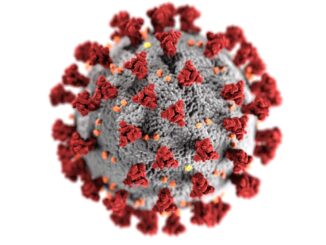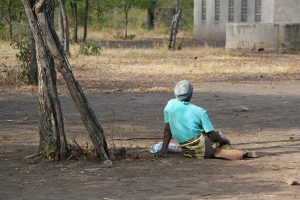
Many of Zimbabwe’s rural communities lack soap. So in the fight against COVID-19, people are using ashes.
“Communities are drawing lessons from the 2018 cholera outbreak where villagers who couldn’t afford soap were encouraged by authorities to wash their hands using ashes,” said Siphephile Siziba, a community leader from Nsezi village located in the southwestern region near Bulawayo. Many communities in Umzingwane District-Matabeleland South lack sanitizer, soap and masks, she said.
Beyond efforts to secure soap and sanitizer to prevent the spread of COVID-19 is the deeper challenge of drought. Climate change has resulted in successive dry spells and the drying up of water sources. For communities in Matabeleland South and North Provinces, people are struggling with extreme food and water shortages.
COVID-19 has worsened the underlying structural and perennial problem of water shortages in Matabeleland North, South and Bulawayo provinces, said Dumisani Nkomo, chief executive officer for Habakkuk Trust, a nonprofit organization.
“In rural areas, people have to leave their homes to fetch water. Some communities have to queue for water at borehole points and that impacts negatively on social distancing,” said Nkomo. “So really the fight against COVID-19 is a multi-faceted problem, especially on women and children who bear the brunt of walking long distances to fetch water.”
Women generally hold responsibility for the care of households and children, which means grueling hours of hunting for firewood, seeking water, caring for the family crops, childcare and cooking.
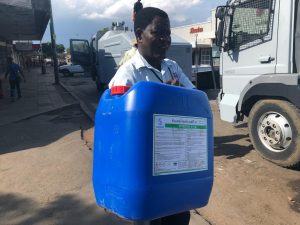
According to the Emthonjeni Women’s Forum, a nonprofit organization that works in rural communities around Umzingwane and Matabeleland North, women are typically the primary care-givers, especially during pandemics, and are therefore more vulnerable to contracting the coronavirus.
The forum advises communities on hygiene, social distancing and sanitization at boreholes and surrounding areas to prevent the spread of COVID-19, and even agrees with the use of ashes.
“In cases where families don’t have soap, villagers can supplement with ashes as per traditional social norms. We call upon the government and local councils to assist rural communities by accelerating the drilling of boreholes, as water is essential to prevent the spread of COVID-19,” according to the forum.
The lack of water resources also means tap water is rare. In response, the non-governmental organization World Vision Zimbabwe installed tippy taps in the Matabeland North Province. Tippy taps use a clean plastic container and simple construction to allow a user to access a “tap” by tipping the bucket.
Despite villagers complying with the national lockdown order by Zimbabwe’s president, Emmerson Mnangagwa, “rural communities have been left out in terms of testing for COVID-19, and other interventions such as food relief programmes,” said Nkomo. The country has been under lockdown since 30 March.
Villagers in Maphisa district, south of Matabeleland South, said the local government has “turned its back” on its rural citizens in the fight against COVID-19 because most villages lack access to clean water.
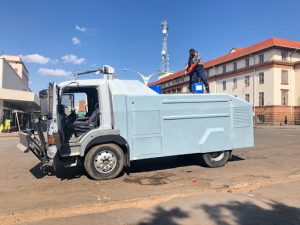
“The Maphisa community has a perennial water problem. As we speak, there is one functioning borehole servicing a large population of about 50 households and their livestock. Six boreholes don’t function due to lack of spare parts, and washing our hands frequently to prevent COVID-19 becomes a huge challenge,” said Samantha Ncube.
When asked what the Zimbabwean government was doing to alleviate water shortages during the COVID-19 pandemic in rural areas, Moment Malandu, the coordinator for the Matabeleland South District Development Fund, said his department is drilling more boreholes in rural communities.
“In the beginning of the year 2020 from January till today, we drilled 50 boreholes in Matabeleland South province. Due to the COVID-19 outbreak, we scaled up its borehole drilling programs targeting isolation centers and hospitals,” said Malandu. “The major challenge faced is fuel shortages and lack of borehole spare parts.”
Meanwhile, across cities in Zimbabwe, the government developed a disinfection program using hydrogen peroxide to disinfect COVID-19 hotspot areas that are most populous, such as bus stations, markets, high-density suburbs and sidewalks.
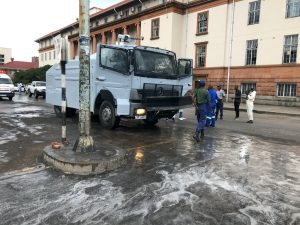
The disinfecting program will cover the areas where vendors mostly operated from, said Bulawayo city’s Patrick Ncube, divisional environmental health officer.
“Government gave us 30×35 liter containers of hydrogen peroxide and we started spraying at a concentration of 0.1%. Hydrogen peroxide is a highly corrosive chemical which eliminates the virus,” said Ncube. “It should only be handled by trained people and is not for households.”
Nathaniel Moyo, a vendor who operates at Bulawayo’s busy Fifth Avenue market welcomed the sanitization.
“Hundreds of residents usually flock the market place and disinfecting such is a good move,” he said.
(Editing by Christian Scheinpflug and Stephanie Mikulasek)
The post Ashes instead of soap: Inside Zimbabwe’s COVID-19 fight appeared first on Zenger News.






